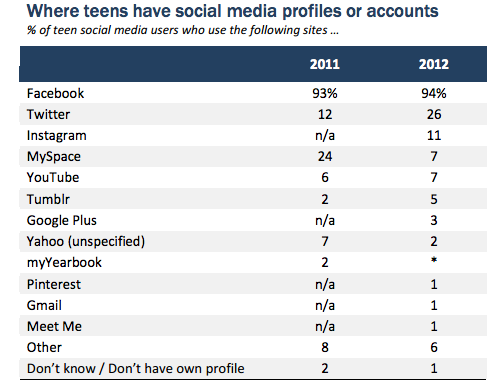Rosalind Wiseman's Blog, page 35
September 23, 2013
Masterminds & Wingmen – New York Times Bestseller List!
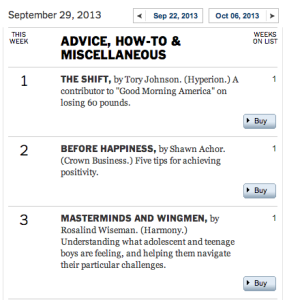 # 3! Check it out! New York Times Bestseller List
# 3! Check it out! New York Times Bestseller List
I’m shocked! I’m excited! I’m humbled! I’m trilled! I think we found a need.
September 17, 2013
Masterminds & Wingmen Book Tour – Skyline Chili and Family Circle
 It is week two and we’re in Cincinnati, Ohio. Many of our closest friends have been RAVING about Skyline Chili so we had to give it a try. This picture was taken when Rosalind did a Q&A with Family Circle on Facebook. Oh, the perks of being on the road — eating while working and working while eating is typical.
It is week two and we’re in Cincinnati, Ohio. Many of our closest friends have been RAVING about Skyline Chili so we had to give it a try. This picture was taken when Rosalind did a Q&A with Family Circle on Facebook. Oh, the perks of being on the road — eating while working and working while eating is typical.
This week we’ll be seeing a number of other Skylines (the cityscape type) as we tour through the mid-west. It will be the busiest week of the month; lot’s of miles to drive, books to sign, people to see, and fish to fry. Rosalind and Charlie will be at The McCoy Center near Cincinnati tonight, then driving to Columbus to the St. Xavier High School the next day. No rest for the wiry because the show must go in. A quick trip from Columbus to Detroit and speaking at the Marquis Theatre in downtown Northville to then jump on a plane for Chicago. Two nights around Chicago and back to Boulder. Phew!
September 11, 2013
Masterminds & Wingmen Book Tour – And We’re Off!
 And it begins! The day we’ve been waiting for, Masterminds & Wingmen and The Guide published yesterday, which kicks off Rosalind’s 14 city book tour. The first stop is New York City with the TODAY Show and Trinity School tonight. This isn’t Rosalind’s first rodeo so we’re excited I have no idea what’s in store except for great people,for what’s coming. Please say hi if you come to any events!
And it begins! The day we’ve been waiting for, Masterminds & Wingmen and The Guide published yesterday, which kicks off Rosalind’s 14 city book tour. The first stop is New York City with the TODAY Show and Trinity School tonight. This isn’t Rosalind’s first rodeo so we’re excited I have no idea what’s in store except for great people,for what’s coming. Please say hi if you come to any events!
All Rosalind’s speaking events can be found on her events calendar here – Rosalind’s Events Calendar.
August 30, 2013
Family Circle: Can Boys And Girls Be “Just Friends”?
 In two weeks my book about boys, Masterminds and Wingmen, will be published. (You can enter to win a copy here.) But I’ve just realized it didn’t include a critical issue I need to share with parents. So what better place to tackle that topic than my Momster Blog?
In two weeks my book about boys, Masterminds and Wingmen, will be published. (You can enter to win a copy here.) But I’ve just realized it didn’t include a critical issue I need to share with parents. So what better place to tackle that topic than my Momster Blog?
In Masterminds, I spend about one-third of the book explaining how boys interact with girls. I cover:
- what they think about girls,
- their experiences with girls that they don’t tell adults, and
- what their parents say to them about girls.
I also talk about girls as friends. Boys, especially in high school, often have friendships with girls that are incredibly meaningful to them. Here are a few of the comments that two of my high school guy editors shared with me:
“I love hanging with my boys but I’ve had the closest of relationships with my mom growing up so I naturally function better when I have close girlfriends around me.”—Ryan
“I think guys can look at girls and think of them as someone who they can talk to about sensitive subjects. You really can’t talk about sensitive subjects with your best guy friends because you know their opinion of you prior to whatever you have to say. With girls, you can tell them more without knowing them as well.”—Grant
That part I knew. What I didn’t realize can best be explained by Raffael, another guy contributor, when we talked a few days ago:
“Last spring I was really stressed out. I was playing football and filling out twenty-two college applications. So I decided to break up with my girlfriend. Two days later I realized that I had made a horrible mistake and I needed someone to talk to. I couldn’t talk to the guys on my team because we don’t talk about things like that. We talk about who we’ve hooked up with but not relationship stuff. So I take a really good girl friend out to dinner so I can get her advice and when I am walking out the door I tell my mom where I am going and she starts probing me with all these questions about the girl as if I want to hook up with her. This was my friend. And my mom is accusing me of trying to get with her just two days after this break up.”
That’s the part I didn’t realize. Parents often reinforce the stereotype that boys and girls can’t be friends. We don’t mean to do it, but we do. Boys need friendships with girls for many reasons. They know having a strong friendship with a girl can give them the “girl” insight they need. But we all need boys to have strong friendships with girls so as they mature they know how to collaborate with girls, compete with girls and have healthy intimate relationships with them.
What do boys want from us? They want us to stop probing them with questions that come across as if we think all they want from girls is to get it on. That’s true whether they’re in 4th grade and we’re teasing them about who they have a crush on or they’re in high school and we’re assuming that their real motivation for having close female friends is sex.
This doesn’t mean it’s not possible for boys to be sexually attracted to a girl that’s a friend. But instead of making comments, what boys want is relationship advice. I know that sounds completely different than everything we think about them, but it’s true. They want an adult who they can ask questions and get direct, straight up answers from. They want an adult who role models how to have healthy intimate relationships and who treats their partner with dignity.
Do you think boys and girls can be “just friends?” Are you guilty of making your son’s friendships seem like something more? Post a comment and tell me.
Originally posted at Family Circle Momster
August 22, 2013
Family Circle: Are We Setting Our Kids Up For Social Incompetence?
 Last week I posted a mother’s question about her daughter’s struggles to maintain friendships with other girls. Today, I’m responding to some of the reader comments made in reaction to my advice.
Last week I posted a mother’s question about her daughter’s struggles to maintain friendships with other girls. Today, I’m responding to some of the reader comments made in reaction to my advice.
While I certainly don’t have the one and only answer to this mother’s questions, I want to show you what I think are the most important aspects of her story and as a result also show you why I answered as I did. I also want to take this situation as an opportunity to challenge all of us about the advice we give our kids.
From my perspective, here’s what was different about her daughter’s situation—and, thus, more complicated.
This mother described a pattern where her daughter would become friends with a group of girls and then be rejected by them.
This rejection took place in and outside of school. (In an extended email from the mom she mentions summer friends and swim team friends).
She never knew why and, understandably, her daughter didn’t want to talk to her mother about it.
I suggested that this girl at some point prepare to ask one of the girls why they had rejected her. I said it wouldn’t be easy and, yes, the girls could simply be jealous. But if there was a chance that there was something this girl was doing that was off-putting to the other girls, it was important to know that.
Some readers really disagreed with me because they felt I was setting the girl up for more rejection. My response to that is: the girl is being rejected anyway. Being continually rejected but taking no steps to figure out what is going on and doing nothing to advocate for yourself, takes all power away from the daughter.
In fact, the goal here is to face a situation that is difficult and intimidating. If she prepares with support, she will be proud of how she handles herself—no matter how the other girl acts. True self-esteem only comes from facing challenges that are unpleasant and sometimes intimidating. If we don’t build up our children to be able to face difficult social situations they will not be able to handle them. It’s not easy and they need support every step of the way. But they have to face these kinds of problems. If they don’t, we are setting our kids up for social incompetence.
Another reader said: “Any discerning mom would know” if the girl had social skills problems that were causing the rejection. The implication being that because this mom hadn’t identified her daughter as having social skills deficits, her daughter didn’t have them. I strenuously disagree with this statement. Not only because I have seen so many well-meaning parents be blind to the social skills deficits of their children but also because we, as parents, aren’t around to see how our teen children act around their peers. We may think we know based on how our children act around us. But that is making a huge assumption that I have found time and time again is wrong. Our children often act differently around their peers than they do around us.
Another reader commented: “I used to remind my daughter that Girl World is not the Real World so that it doesn’t matter if she’s popular/accepted or not because she will never have to see any of these people again.” With all due respect, this is missing the point. Girl World—where conflicts are inevitable and some people abuse social power over others—is the Real World. Again, our children need to build social skills and you only build them by understanding and preparing for the inevitable—getting into a conflict with another person. No, you don’t have to be friends with everyone. Popularity isn’t the goal. The goal is maintaining a sense of self in the midst of a group.
Here’s a comment I really agreed with: “If she complained of feeling rejected, I would help her recall her social successes and what felt ‘right’ about them. I would encourage her to seek friendships that give her those feelings, and to provide the same in return to her friends. I might also remind her that she herself has rejected some people, by not inviting every child to her birthday parties, for example.” Here is a parent giving a daughter a concrete skill—checking in with herself about how she feels around her peers.
What’s most important to me is that as parents we really stop (me included) to hear each other and listen to our children when they are going through the inevitable but still really challenging and sometimes-painful conflicts they get into with their peers. I believe so strongly that our children are able to handle the messiness of these situations—including social rejection—if we support them behind the scenes.
What do you think about whether this daughter should confront a former friend? Post a comment and let me know.
Originally posted at Family Circle Momster
August 9, 2013
Family Circle: When Your Kid Can’t Keep Friends
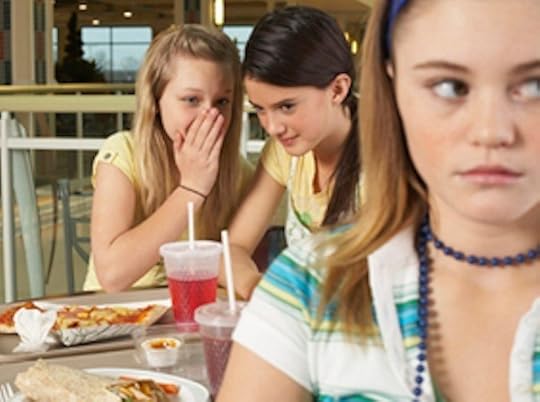
Recently, a mom wrote to me with the following problem:
“I have a 14-year-old daughter who is starting high school in the fall. Since she was a toddler, she’s always been confident and outgoing with lots of friends. She is beautiful, multi-talented and very smart. In the fall of 7th grade, her elementary school friends turned on her and she has not been able to find new ones since. Every time she makes friends, they eventually blow her off—making up excuses for not getting together or ignoring her when they see her—again and again. She ends up excluded, alone and blaming herself for somehow being ‘annoying.’ She gets defensive and angry if I talk about my experiences a zillion years ago or challenge her assumption that she is a loser. How can I help her?”
While this is not an unusual problem, the answer to it is pretty complex. But first let’s address the easier issue of this mother’s well-intentioned reaction to talk to her daughter about her own experiences and assure her daughter she’s not a loser. Both, in this case, are counter-productive for the following reasons. First, talking to the daughter about her past experiences probably comes across as if she thinks they’re the same and the daughter understandably doesn’t agree.
Second, instead of assuring her that she’s not a loser, a parent in this situation is better off saying something like: “If you really are feeling this badly about yourself, then we need to think through how you can feel better. You’re old enough that I know you want to figure this on your own but I’m asking that you trust me enough that we work on this together.”
Now, on to the more complicated issues. Girls in her position often learn to either hate other girls or turn themselves inside out trying to please the girls who are rejecting them. Not good. But here’s the hard thing to think about. Since this is a pattern of behavior, the big question is does this girl (and maybe by extension the mom) really want to know what the other girls think is the reason/explanation for their behavior? Because sometimes figuring out the reason for something can be pretty painful. In case either one of them do, here’s what I think are the most likely possibilities.
The girl really is as beautiful, multi-talented and smart as the mother says she is. As much as any parent loves having a child like this, it can easily cause friction with other kids. There are girls who are alienated because they’re good at something, intelligent, pretty and have a good body. (A girl can be pretty or have a good body without girls being jealous. If she has both, chances are good that they’ll either exclude her or worship her.)
Many parents, in reaction would say, “Those girls are all jealous and you can’t let them get you down.” This response is a way too simplistic soundbite. Jealousy is a complicated emotion and it often rages in the best of kids. Also there’s a very, very good chance that even if they were jealous, these other girls would never admit it to anyone—including themselves. Instead they would come up with reasons, that they absolutely believe, that justify their anger and rejection. Usually, the “reason” is that the girl is always trying to get attention or she thinks she’s better than the other girls because she’s always doing “x.” But that explanation doesn’t give any guidance about how the girl should manage herself so she feels better about how she’s handling the situation.
As a parent of a girl who is starting high school, this is the time for the daughter to figure out what’s going on—which means talking to some of the girls who have excluded her in the past. Here’s a suggestion for what she can say.
I know we aren’t friends anymore and I’m not calling you so things can go back to the way we were before. I’m calling because I really don’t know why you stopped wanting to hang out with me. I know this may sound strange but I want to know why. Maybe there’s something I need to hear and it may be hard for me to know but it’s important.
There’s a chance that the other girl will unleash on her. Or do the opposite by saying “No!” Or even say, “You promise you won’t get mad at me?” If that’s the case, the daughter can say, “I’m asking you to be honest but I hope you realize it may be hard for me.”
The big challenge here is separating the other girls’ baggage (jealousy, and insecurity) with the possibility there is something your daughter is doing that is pushing the other girls away: likenot giving them enough space or not picking up small ways people communicate when they’re asking someone to stop doing something that’s irritating.
Bottom line is she shouldn’t apologize for her accomplishments or her natural characteristics. But if there’s behavior that she needs to self-reflect on, this is where she’ll learn to get difficult feedback from other people and uncover what she may need to change about how she conducts herself.
Remember I said be careful about the questions you ask because you may not really want the answer? Sometimes, even though it’s difficult and unpleasant, this is the way a girl can develop strong friendships she can depend on.
What would you advise this mom to do? Post a comment and tell me.
Originally posted at Family Circle Momster
July 26, 2013
Family Circle: Have You Talked To Your Child About Trayvon?

If you are a white parent of an older child or teen, have you discussed the Trayvon Martin tragedy with them? When the verdict came in over the weekend, I realized that I had not.
For a moment, I was shocked and then ashamed. I realized, as I have many times before, that my experience as a white parent raising a white son is a very different experience than it is for black parents raising a black son. I was reminded yet again, of what race “privilege” as a parent really is: the freedom to believe your child will be seen as a person, not reduced to a reflection of people’s fears and biases.
About six months before Trayvon’s death, I had a conversation with a group of high school boys about when and how they sneak out after their parents go to bed. At first the conversation was light and revolved around the boys comparing funny stories. But everything got quiet when one of the boys said:
You guys have no idea how different it is for me as a black man. So my parents don’t get suspicious, I wear sweats and a hoody so if they see me it looks like I’m in my pajamas. But what if someone on the street sees me trying to get in or out of the house like that? They immediately will think I’m robbing the place. Or if I do sneak out, then I have to walk down the street…a black man wearing sweats is not a good thing late at night in a suburban neighborhood. You know it’s only a matter of minutes before the police stop me and ask me if I live here. I could be wearing my school sweatshirt and they’d still question me.
As he related all the complexities of sneaking out his white friends were speechless. He was a good friend of theirs and they had no idea how walking through the world was so different for him. I remember one of the other boys saying, “If I ever get stopped by the police, all they assume is I’m high or drunk.” Another boy said, “I had no idea it was like that for you. I got caught in exactly that same situation last weekend but the police gave me a little lecture and then drove me home.”
If you’re a white parent and you haven’t talked to your children about Trayvon, please ask yourself why not? Does it seem too ugly and violent? Are you not sure what to say? Do we not see this as our issue?
It is our issue. Not only because we probably have friends of other races and/or our children do but because we need to teach our children to empathize—that there are people in our country who feel like their children are first seen as a problem and threat rather than a kid walking down the street.
Yesterday, I asked my boys what they knew about the case and they did know the basic facts. Then, we listened to the radio and read some of the newspaper accounts and opposing op-eds that followed the verdict as in USA Today or Wall Street Journal. We talked about racial stereotyping and fears that we all develop; whether we are aware of them or not.
But like much of parenting, the teaching moment came in an instant when I wasn’t expecting it. Not an hour later I was in the car with my boys when a guy in another car honked his horn and obviously cursed me out. Immediately my older son said, “Mom, that guy just swore at you, can I middle finger him?”
“No.” I replied. “We have gone over this a thousand times. No.”
“Why? He was cursing you. Come on, just one time,” my son said.
Then it hit me how to connect our conversations about Trayvon with this seemingly unrelated and ridiculous request. This is what I said:
Here’s one difference between you and Trayvon. As a young white man, you have the luxury of being foolishly rude without the other person assuming that you’re violent. Boys like Trayvon don’t have that luxury. They can’t middle finger someone without being seen as an angry black man. Now imagine that the guy who you get into the argument with, the one who just cursed me out thinks all young black men are punks who need to be taught respect. And you, as a young black man have had enough experience to know this. Sometimes you’re so mad about it you want to scream. Sometimes you’re scared and want to defend yourself. Do you see how easy it is for you to want to flip off that guy and not think anything of it? Can you see how different it is for other boys? Just think about it.
It got very quiet in the car and then my son said, “I get it.”
Originally posted on Family Circle Momster
June 28, 2013
Is the Answer No? Ask for it, Anyway
 One of the most important skills we learn as girls is the ability to ask without knowing the outcome: to apply for an opportunity we might not get, to raise our hand even if we don’t know the right answer, to ask for what we want even if the answer will surely be no.
One of the most important skills we learn as girls is the ability to ask without knowing the outcome: to apply for an opportunity we might not get, to raise our hand even if we don’t know the right answer, to ask for what we want even if the answer will surely be no.
Yet when it comes to friendship problems, too many of us don’t say what we need because we worry we’ll hear the word no. The fear of getting rejected, or the fact that “things will never change” are the most common explanations girls and women share about refusing to speak up.
When we are driven by the anticipated outcome – the word “no” – we allow fear and anxiety to make our decisions for us. We don’t develop the vital muscle of risk taking that allows us to take leaps, be surprised and discover new experiences we never would have had if we’d played it safe.
This is a missed opportunity, not only for women’s relationships but for our leadership potential. Yesterday, Slate’s Katherine Goldstein blogged about her experience in a Lean In group. After three months together, three out of seven members have asked for raises at work.
There are few requests more uncertain and anxiety provoking than asking for a raise. But what’s even more impressive is that one of Goldstein’s colleagues asked even when she was pretty sure her organization’s budget couldn’t afford it.
Even when she knew she’d most likely get rejected.
“I just wanted to voice that I expected to be paid more,” the woman explained. “So the lesson I learned was that even in an organization with limited resources, asking is a huge deal.”
Imagine if girls and women adopted the same attitude about confronting the friends who have let us down. Instead of giving up before saying a single word, we would choose to value our voices. We would privilege the importance of speaking up for ourselves over the outcome for the relationship.
I often say girls’ relationships are their most important classrooms. It’s in our first intimate relationships where we learn how to stand up for ourselves, negotiate to get what we want, and compromise.
But it’s also in friendship that many of us learn to value the relationship over ourselves. It’s where we internalize the belief that preserving a connection – and someone else’s opinion of us — is more important than saying what we really think.
Over time, as we choose not to speak up and tell that friend to stop bossing us around, or that she’s been neglecting us, or that we’d like her to stop asking us how much we paid for our clothes, two things happen: the muscles to assert our feelings atrophy. And our beliefs about conflict – namely, that we should avoid it if we don’t know what the outcome will be – start to direct our choices.
What we learn in our friendships as girls becomes the foundation for the skills we employ across all areas of our lives as women, and especially when we get our first job.
As I tell my undergraduate students, if you can’t tell your roommate that you need her to turn down the music at 1 am, you won’t magically be able to ask a colleague to stop telling offensive jokes.
That girl who refuses, over and over again, to tell her friend how she feels because “what’s the point” and “she won’t care, anyway,” may become the woman who refuses to ask for a raise because “what’s the point” and “there’s no money, anyway.”
If you’re parenting a girl, encourage her to advocate for herself just for the sake of using her voice and communicating her value. If you’re a recovering girl, these lessons apply to you, too. Speak up, for the sake of speaking up. Every day, all around us, we have the chance to practice.
Because we need to be able to deal with rejection if we want to ever hear the word “yes.”
First posted on rachelsimmons.com
June 24, 2013
Family Circle: Teaching Your Child To Deal With Anger
 Recently, I was sitting on my 12-year-old son, Elijah’s, bed. The lights were out and he was under the covers—as in he’d pulled the covers up over his face.
Recently, I was sitting on my 12-year-old son, Elijah’s, bed. The lights were out and he was under the covers—as in he’d pulled the covers up over his face.
Me: Honey, it’s ok to say that you’re frustrated and upset.
Elijah: I’m fine, grabbing his pillow and putting it on top of his face.
Me: You can’t bottle up your feelings. It’s like you’re covering up a volcano. Sooner or later it’s going to explode and that feels even worse.
Elijah: Mom, please I just want to go to bed.
Me: Ok…just think about it. I love you.
This conversation occurred about two hours after Elijah had not listened to me or his dad and accidentally dropped a 60-pound bag of concrete on our lawn at the exact time our automatic sprinkler system came on. And remember wet concrete very quickly becomes hardened concrete. In his defense, as a somewhat recent transplant from Washington, D.C., none of us have ever lived in a house with:
1. a backyard and
2. a sprinkler system
So it was understandable that he didn’t think about it when he ignored our warning to not leave the bag on the grass. Except for the part about ignoring us.
This incident also occurred a few days after another very unfortunate event inside the house. Elijah wanted to show me that he could flip a can of spray paint in the air. When he caught it, the little nozzle came off and red paint started spraying everywhere: the walls, the floor, the sink, the faucet. The goods news is that Murphy’s Oil Soap took off all the paint—but not without me expressing my frustration and anger.
Teaching our children that it’s healthy to express these feelings is one of the most important responsibilities we have as parents. But it’s not easy because very few of us are taught how to deal with these messy emotions well. That’s the thing about families. They give us endless opportunities to practice expressing healthy ways to be angry and encouraging it in our children.
Don’t get me wrong. I didn’t sit down with Elijah in a calm, kind voice and tell him how “concerned” I was about the paint and how I really “hoped” he’d be more thoughtful next time. No, I fumed. I did my angry sigh—the thing both my boys know is the sign that I am making every effort not to completely lose it.
But back to the concrete: As Elijah went through the usual phases of denial and blame (on his brother and the neighbor’s dog), he tried to clean up the mess…by tracking even more of the concrete throughout our house. At this point, my husband was yelling, Elijah was sulking and I wanted to run away.
Thirty minutes later, with everyone in a terrible mood and hating each other, Elijah went into his room. And there I was still feeling angry. I mean, really. How many times do I have to tell my boys to listen to me when there’s a real possibility of them damaging someone or something?
Sitting on Elijah’s bed, I knew that if I said anything more, I’d just irritate him. But I also knew that he was really upset about how angry his dad was with him. Elijah had done something wrong, without a doubt, but at the same time he was really hurting. So what do you do in that moment?
I walked out of his room and asked my husband to go in there and tell Elijah he loved him. Of course he wasn’t feeling very loving at the moment, but that father-son connection is intense and sometimes the best thing about having a spouse is they can remind you of the larger picture. He does it for me all the time. James got up and walked into Elijah’s room. I don’t know what they said. But I do know the next morning, we all felt better.
Originally posted on Family Circle Momster
June 21, 2013
Grad Night, School Policy and Mobile Media Management
 June 6, 2013 “…Any personal items (including car keys, ids, cell phones) will be bagged and labeled with the student’s name. Digital cameras must NOT have transmission capability and will be left at coat check. Do NOT bring anything but the clothes on your back, your pockets should be empty. No water bottles, yearbooks, purses/ backpacks, money, iPods or iTouch, video recording cameras, or any devices that allow transmission of emails, texting or other data. All students will be subject to a search and pat-down procedure prior to boarding the buses. It is not a date event and NO guests are allowed.”
June 6, 2013 “…Any personal items (including car keys, ids, cell phones) will be bagged and labeled with the student’s name. Digital cameras must NOT have transmission capability and will be left at coat check. Do NOT bring anything but the clothes on your back, your pockets should be empty. No water bottles, yearbooks, purses/ backpacks, money, iPods or iTouch, video recording cameras, or any devices that allow transmission of emails, texting or other data. All students will be subject to a search and pat-down procedure prior to boarding the buses. It is not a date event and NO guests are allowed.”
Wow. You thought the TSA was getting heavy handed…welcome to public high school media management in the 21st century.
Granted, “safe and sober” graduation and prom event lock downs are evidently quite common these days, but as one who grew up “free-range” I can’t help but hear prison door sound effects pound through my head with visions of Shawshank Redemption looping through my mental relay.
I picture the teens in single-file ponying up their phones, digital cams and wired gear like perps in a pat down, breaking into cold sweats as they release the grip from their tech tethers…From what I hear, that’s not so far off, give or take a twitch knowing they’ll have their devices back at 4am or whatever…
”So, where exactly will you BE on grad night? It says entertainment, food, dancing, but no venue,” I said to my teen.
“Oh, they don’t tell us. We don’t know, nobody knows. You’re not allowed to know. Parents aren’t either.”
“Wait, whaaa?” I inquire with incredulity. “So you don’t know if you’re in San Francisco, or the East Bay or on the peninsula, or where the buses even take you?”
“Nope,” she shrugged it off, explaining the secretive bit stems more from school policy and practices than any big ‘surprise/excitement/reveal’ because evidently mobile media and mass-texting makes every event into ‘flash mob’ potential plundering security and making the venue susceptible to pre-planting contraband, stashing it for use later.
Given recent tragedies and media blitzes about bullying, rape culture, victim-blaming, and social media’s role in both fanning and tamping those flames given teens propensity to use mobile/social to connect, it’s understandable to see why schools are not messing around with any behavioral ‘surprises’ on their watch…
Still, it’s hard to see grad night and prom turned into a digital media frisk.
As I started to bristle at the civil rights and freedoms being trampled upon by media scrutiny and tight-lipped controls bordering on protectionism, my teen gave me some much needed perspective, jolting me into the reality of a 21st century digital kid,
“It’s no big deal, they’re keeping the lid on everything extra tight…after Newton, Boston, Sandy Hook, Columbine and all that, you can’t really blame them.”
That put me into a different head space very fast. Wow.
There was the obvious ‘aha’ bracer of how a digital childhood growing up in a ‘post 9-11 world’ of tighter security and flash mob mobile connectivity was markedly different than even the Millennial era of the pre-cellphone PAGER phenom right before it…
…The ‘yakking on the phone for hours’ Gen X and Boomer generation of peer connectivity seems almost like a quaint remnant of TV-land; much less the ‘meet me after school at the…’ (fill in the blank) type of face to face/word of mouth group gatherings of yesteryear.
More disturbing to me was my teen’s casual subtext referring to horrific crimes in “single-word sound bite” form, which rolled off her tongue as if it were an ingredient in the given mix of life…Newton. Columbine. Aurora. They’re no longer just places to this generation of teens, they are ‘happenings’…
This Forbes Gen Z: “Rebels With a Cause” article purports this may be the generation of “resiliency and realism” as teens adapt to media machinations, privacy limitations, and societal degradation with a surreal seamlessness…in most cases, far better than their parents. (at least THIS parent) What do you think of this, parents? Kids?
What’s your firsthand experience in urban, suburban and rural regions and how does it differ across the nation? We’re based in the SF Bay area/peninsula regions of Silicon Valley, is this a bubble of media exposure/experiences or is it universal adaptation to growing up in a different era, as the Forbes article implies?
 This poignant kitchen note scrawled as a ‘just in case’ by my own daughter this year (after one of our local high schools had a ‘Facebook threat’ detected purporting a mass incident) gave me goosebumps.
This poignant kitchen note scrawled as a ‘just in case’ by my own daughter this year (after one of our local high schools had a ‘Facebook threat’ detected purporting a mass incident) gave me goosebumps.
Granted, mobile media and texting teens had already snapped screenshots of the the threats and sent it around via phones, amping the Facebook drama to epic ‘what ifs’ resulting in most of the student body staying home from school that day as authorities clamped down on social media streams using digital forensics in full tilt ‘better safe than sorry’ mode…but ‘what if’ we didn’t have that “Paul Revere” type of warning system flashing through circuitry in nanoseconds?
How has this changed societal stressors and mental health? Particularly when the CDC reports about 1 in 5 teens having mental health issues? Are kids just ‘adapting’ to new circumstances with aplomb or internalizing angst elsewhere?
It’s ‘mental health month’ and I’m hoping we all take a look at media’s pro and con impact while assessing these ‘surges’ being reported in…the media.
On my homefront, we’d had our umpteenth precautionary talk about NOT letting fear-based antics terrorize us into altering how we walk through the world.
I was rather proud that she’d refused to cower to media sensationalism, despite news reports and extra uniformed officers milling around and was headstrong about going to this school play in spite of the timing, as it said something strong about her character and her willful way of choosing to ‘filter’ media messages with critical thinking knowing full well ‘real life’ doesn’t necessarily mirror the reporting served into the mainstream daily. This is consistent with her similar decision to attend the Dark Knight/Batman premiere amidst the aftermath of the Colorado tragedy.
That said, these touchpoints of growing up in a media saturated era of “always on” connectivity made me think long and hard about the wild frontiers of parenting in this digital age, much less living as a teen today. Yes, these teens have the power of insta-communication with peers in their pocket 24/7, but those privileges have come with a cost of freedom too.
 I asked teens from a different school what their ‘grad night’ entailed, and it was similar in ‘all nighter lock down mode’ on a boat on the S.F. Bay, which sounded really fun and festive, until she translated it into my focus of this article,
I asked teens from a different school what their ‘grad night’ entailed, and it was similar in ‘all nighter lock down mode’ on a boat on the S.F. Bay, which sounded really fun and festive, until she translated it into my focus of this article,
“Yah, it was great and no one got seasick, but you have to wonder how ANYone would want to be on a boat for six hours, my friends were falling asleep, and I think they just keep us out late to come home at 4am to make sure everyone’s too tired to throw any kind of “after party.”
Hmn. I see the point…logistics are becoming part of any mass ordeal these days to think through the safety factors, to preclude the ‘what ifs’ so in some ways teens are losing freedoms rather than gaining them when it comes to free agency and digital access en masse.
I’d love to hear from other ‘Class of 2013′ teens on this as well as the ‘graduating 8th grade’ age compression and ‘diva’ dynamics now dialing down to 5th grade bridging into middle school…And the preK to Kindergarten milestone has shifted from photo opp to ‘big kid’ status.
What have your experiences been parents? Young people? What role has media played in policy and practices, and how has this changed the landscape of childhood?
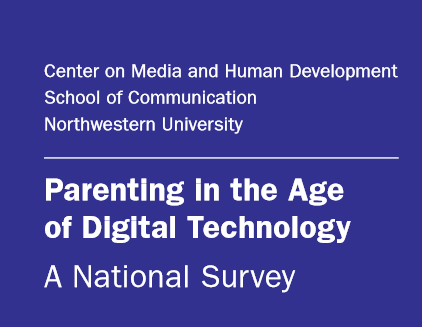 Like fish in water not knowing it’s wet, this next generation of digital kids and parents appear to mesh with media environments as a given.
Like fish in water not knowing it’s wet, this next generation of digital kids and parents appear to mesh with media environments as a given.
In this newly released 52pp Northwestern University study “Parenting in the Age of Digital Technology” it amazes me that media reports managed to summarize the findings of parents of kids ages 0-8, into a rather tweaked New York Times headline, “Most Parents Show Little Worry About Media Use, Survey Says.”
That paints with a ‘broad strokes’ brush on a misleading canvas…
It’s not that parents and kids are not ‘concerned’ or that there’s ‘very little conflict in families over media’ which is how some of this reporting is landing on the interwebs, it’s that media is now part and parcel of our everyday lives, and 0-8 is not the dominant ‘conflict’ zone.
The survey suggests the propensity of children ages 0-8 to mimic parents’ media habits, (versus clamoring for media themselves) which is no doubt all too true…but let’s look at that deeper…young kids mimic parents at that early age in ALL habits. Right?
To me, these ‘parenting digital’ conversations actually bode well for a parental sense of agency and indie control of family life cues to kids, implying that the ‘monkey see monkey do’ approach to the early years can shift context and balance with individualized choices…
Families that want more outdoor time and nature play can use media as simply a reinforcing agent for their messages to kids, or not at all. They can reframe ways to experience nature with ‘netiquette’ in a totally wired world, use media to reconnect families even deeper with nature including meaningful knowledge spheres or unplug altogether to experience the absence of media and tactile adventure of outdoor experiences unfettered.
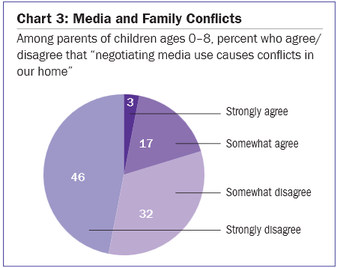 My rub is that the new study is being given ‘the sound bite/infographic treatment’ without a whiff of a headline accurately pointing to media as a gamechanger in the OVERALL role of adolescence and growing up today.
My rub is that the new study is being given ‘the sound bite/infographic treatment’ without a whiff of a headline accurately pointing to media as a gamechanger in the OVERALL role of adolescence and growing up today.
This study is ages ZERO TO EIGHT, not meant to deal with the context of older teens churning in the sea of real life surges, surfing some stormy moments without navigation, like these various school media policies and society dealing with events en masse.
For media pundits and news reports churning headlines like “59% of Parents Don’t Worry if Their Kids Stare At Screens All Day” it not only misrepresents the solid research, giving it short shrift with misinformation on implications…It also misses the opportunity to frame critical thinking around how to a.) instill media mgmt early on, b.) open dialog early and often with media literacy and digital citizenship and c.) address media context and assumptions about “screen time.”
Saying “parental decisions are driving media use” is one thing, but pundits making sweeping implications that there’s ‘no conflict’ among families surrounding media use and implying parents are giving media a shoulder shrug is another…again, reminder, this study is 0-8! Media is a huge ‘change agent’ and influencer in adolescence…
It’s a great time to springboard conversations about the “three Cs” of screen time/media: context, content and the child but without acknowledging the mass impact of digital media’s role in policy, schools, society and new conundrums that come forth daily with older kids, the journalists generalizing headlines as no big deal to parents is simplistic. You can’t just scrape that off like gum on a shoe…parenting in the age of digital technology is a brave new world, and today’s ‘Class of 2013′ (and their parents!) are doing the best they can to adapt and assimilate to the nuance.
So, hats off to you graduates…
You’re forging forward as pioneers into a much different future, helping to make and manage new media roles and rules as they morph from devices to new and exciting digital fabrications we have yet to even comprehend in terms of implications as societal gamechangers…from tech sensors to 3D printing.
Viewing media context in macro versus micro, holistically vs slices of age groups and demographics is key to processing how successful we’ll all be handling these emerging changes.
As we look toward tomorrow, let’s keep an eye on what we’re gaining AND losing from freedoms to eco systems, in order to make sense of the interconnectedness of it all.
What are your media rules at schools for mass events these days? What about new ways of using media as graduates merge into the next sphere of life? (My own teen is already connecting with a potential roommate via an app that filters personality/lifestyle preferences in the dorm, all using mobile/social media)
I’d love to hear more about media’s role in your own graduations at every age and stage…Parents? What’s it like to be “parenting graduates in a digital age?”
Visual credits: Lead generic graphic, SurreySchools.ca, social media job search/grad
Originally posted on shapingyouth.org

